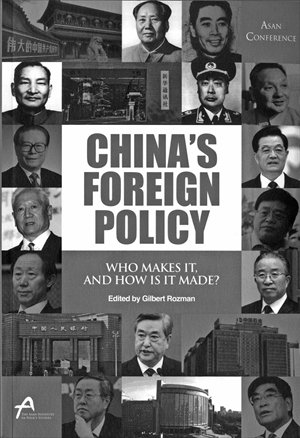Beijing's foreign policy comes under scrutiny as global role grows

As China's economic, military, and political clout continue to grow, its foreign policy, once largely a concern of Washington wonks, has become a topic of public debate. China frequently proclaims its peaceful intentions, although jingoistic rhetoric has become more common in recent years. Rising territorial tensions in East Asia, the US "pivot to Asia," and leadership change in North Korea have all left the region the focus of intense international scrutiny.
But the Ministry of Foreign Affairs is one of the most opaque parts of the Chinese government.
Even for experts, it's a difficult task to determine exactly who is in charge, and what influence such varied forces as military academies, international relations think tanks, and angry netizens have on foreign policy.
China's Foreign Policy: Who Makes It and How Is It Made? (Asan Institute for Policy Studies, 2012) tackles these issues. It presents a selection of papers originally discussed at the 2012 Asan Conference in Seoul, gathering the views of a wide selection of Western, Chinese, and Korean scholars.
The diversity of the papers makes the book a fascinating introduction to the myriad factors that influence Chinese foreign policy. Princeton professor Thomas Christiansen contributes the lead essay, summarizing and discussing the challenges faced by China's next generation of leadership in a changing international environment, followed by two further essays by Avery Goldstein and Shin Jung-Seung on the likely course the new leaders will follow.
Bonnie Glaser and Zhao Quansheng, meanwhile, focus closely on the influence of think tanks, foreign policy institutes, and other quasi-governmental organizations.
Distinguishing exactly who has the ear of the powerful is a complicated task, and there are no clear answers, but the concise summary and likely pointers given in these essays offer a useful starting ground.
Gilbert Rozman and Robert Ross explore more complicated issues of national identity, drawing upon Chinese sources, both official and populist, to explore national attitudes toward China's place in the world, the role of the US, the Arab Spring, and other issues of the day.
William Overholt and Francois Godemont offer a rigorous exploration of Chinese financial priorities, and how they influence and restrict national decision making.
These papers were written before the Diaoyu Island crisis, erupted, but they seem particularly relevant in light of China's historical tensions with Japan.
Finally, Chen Ping, Hao Yufan, and Peter Gries explore China's role on the Korean Peninsula. Chen, an editor at this paper, offers an incisive exploration of China's limited influence on North Korea, while Gries gives a rigorously statistics-based exploration of the attitudes of Chinese netizens toward both Koreas.
All in all, this is an important volume for anybody interested in the future of East Asia.